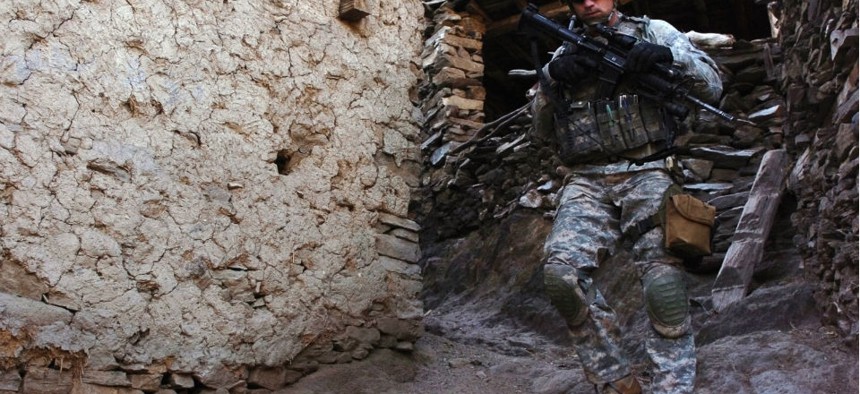
U.S. Army Pfc. Perry Price patrols the village of Aliabad in Kunar province, Afghanistan. Sgt. Matthew Moeller/Defense Department file photo
Afghanistan Finally Signs Elusive Security Pact With United States
Agreement will allow for nearly 10,000 American forces to remain in the country.
The proverbial tickertape from new Afghan President Ashraf Ghani's inauguration hadn't even been swept up before a long delayed bilateral security pact with the United States was signed on Tuesday. The agreement will allow for nearly 10,000 American forces to remain in the country.
It was an act that Ghani's predecessor Hamid Karzai had avoided, seemingly taunting frustrated U.S. officials as they pressed him to sign the agreement that would keep a stabilizing American presence in the country.
The context for the pact's signing was also noteworthy: Last week, dozens of Afghan civilians were killed in a Taliban offensive that included a series of attacks and beheadings. As the NBC News reported, Ghani, who took power in a protracted power-sharing deal, emphasized the need for calm: "This is a turning point in our relations with world. There are common threats and we need to have common partnership to fight it. We have the will to bring about peace and stability to this country.”
Sudarsan Raghavan highlights some of the key provisions of the pact:
Under the BSA, as it is called here, American forces would keep some bases in the country. It also prevents U.S. soldiers and military personnel from being prosecuted under Afghan laws for any crimes they may commit; instead the United States has jurisdiction over any criminal proceedings or disciplinary action inside the country. U.S. contractors and their employees do not fall into this category and would be subject to Afghan laws."
Prior to the agreement, most foreign troops were slated to leave the country by the end of the year. A separate agreement will also allow a small force of NATO troops to remain beyond 2014.






